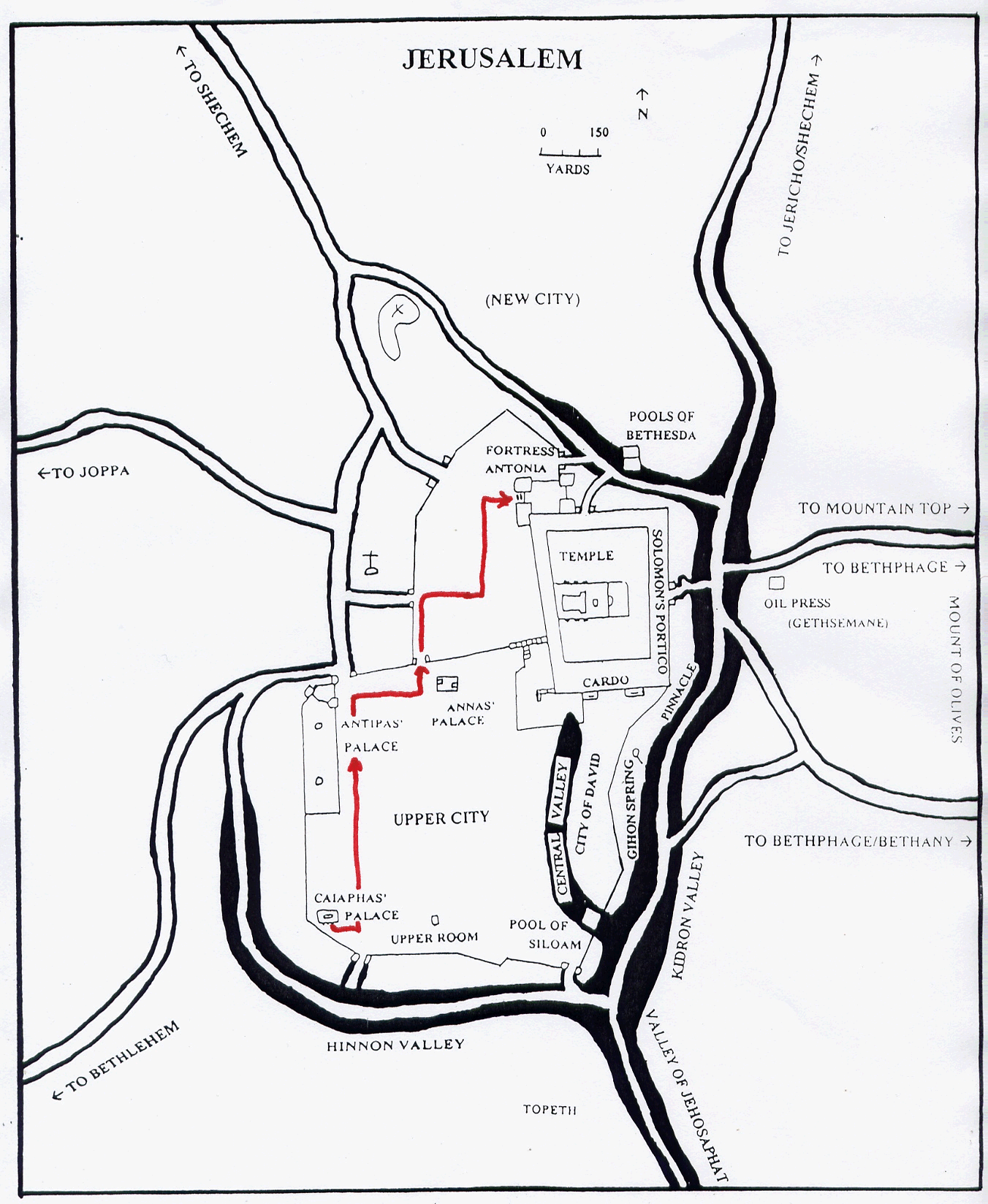80 – First Trial Before Pilate
Where: Antonia Fortress, Jerusalem, Judea
Scripture:
Notes:
Listen to audio
Pilate had only been in charge for four years. He usually lived in Caesarea on the Mediterranean coast, but came up to Jerusalem for the major festivals. The Roman procurator knew the kind of trouble that could get started in Jerusalem, given the wrong circumstances, and it was a good practice to be where trouble might begin.
The Romans had worked out an arrangement with the Jews of Jerusalem. If a non-Jew enters the Temple, then it was OK to kill them in a fit of religious passion. But in other cases, where a trial might take place, the Romans had to be informed and give their consent for the death penalty.
The temple guards, and the representative of the religious leaders, marched Jesus to the Fortress Antonia where Pilate was staying while in Jerusalem. The Romans took possession of the prisoner at the gate and escorted him inside. But the Jews, not wanting to “dirty” themselves because tonight they wanted to celebrate the Judean Passover, did not enter inside.
Pilate, wanting to get some “political mileage”, publicly asked them what the charges were against Jesus. ‘Misleading people with bad teaching?’ Pilate clearly saw that the religious leaders were trying to make the Romans look bad, and he decided to turn the tables and make them look bad in front of the people. ‘What kind of charges are these? They won’t hold up in a Roman court. Has this man broken any Roman laws?’
The leaders did not want to go this route but were now forced to begin that journey. They pressed on, having received instruction from Caiaphas. ‘He claims to be the long awaited Messiah, kind of like a king.’
Pilate’s response was “dripping” with humorous sarcasm and poisonous barbs. ‘Let me get this straight, you are turning over your own king to the Romans for trial?’ Pilate knew that the story would get out and the zealots, and others, would never forgive, nor trust, the leaders again.
Pilate’s work at the gate being done, he went inside to confront Jesus. When Jesus was brought before him, Pilate went straight to the heart of the charges. ‘Tell me straight, are you a king?’ he asked.
After a pause, Jesus answered. ‘King is your word. Do I look like a king of the Jews?’
Pilate responded, ‘How would I know. I am not a Jew.’ Then Pilate went through the list of charges asking Jesus to respond to each one. But Jesus remained calm and said nothing throughout the proceedings, as though he were dealing with foolish children’s questions rather than the powerful Romans. And by the end of the first round of questions Pilate was getting a queasy feeling about Jesus. Pilate felt that he knew Jesus well enough so as not to believe that Jesus was a terrorist or revolutionary.
Yet Pilate was determined to use this situation to his advantage, as any shrewd politician would. The idea crossed his mind to play the crowd against the religious leaders. The religious leaders expected him to announce a finding of guilty and the people expected Roman “injustice” to come to the same conclusion. Good news for the religious leaders, bad news for the people. So when Pilate announced that he found no crime in Jesus, the religious leaders panicked and the people took hope.
The religious leaders re-grouped, and again demanded that the Romans find Jesus guilty and condemn him to death. ‘He thinks he is a king, and he is stirring up trouble in Judea just as he had in Galilee’, they argued. Here was a bit of new information. ‘This could be useful’, thought Pilate, and had Jesus brought back in.
DAB
No questions have been asked yet.

